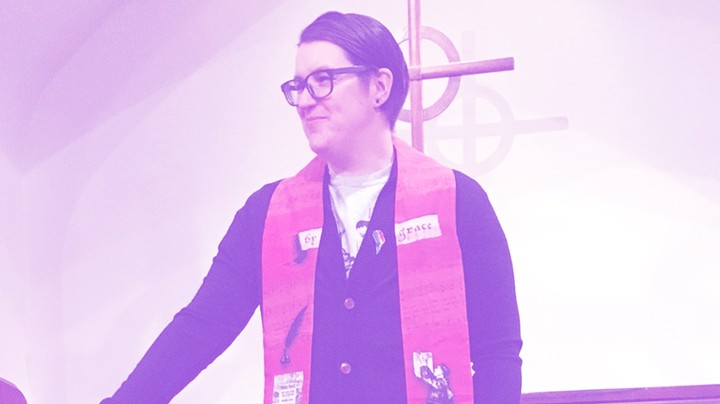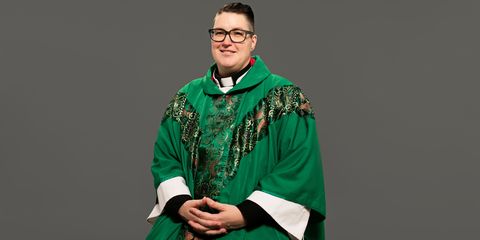The Trans Pastor Building LGBT-Inclusive Faith Communities
"If people of faith could love the fabulous diversity of their neighbors as much as they love God—we would change the world."
DEC 20 2017, 8:42AM

Photo courtesy of Megan Rohrer
You Know Who Rules? is Broadly's December interview series highlighting women and non-binary people who accomplished incredible things during the dumpster fire of a year that was 2017.
Reverend Megan Rohrer is the first openly transgender minister with the Evangelical Lutheran Church in America. The 37-year-old activist, pastor, and author preaches that we should use faith to unite, rather than divide us.
After growing up in small town South Dakota, Rohrer moved to California to complete their Master of Divinity degree from the Pacific School of Religion in Berkley. Shortly after, they started working at the Grace Evangelical Lutheran Church in San Francisco, and has been a pastor for just over a decade.
This year, Rohrer became the San Francisco Police Department’s first LGBTQ Chaplain, founded Singers of the Street, a choir made up of homeless or formerly homeless people and advocates, and initiated Welcome, an organization aiming to abolish poverty with housing, clothing, and food programs.
Broadly spoke with this pioneering faith leader about their accomplishments, common misconceptions about religion, and how we can all be more accepting in 2018.
BROADLY: You've been a pastor for 10 years: what have you learned over the past decade? MEGAN ROHRER: I have. One of the biggest lessons I’ve learned as a pastor is that being your truest, most authentic self is a gift to others. Each week, I preach about ancient stories of faithful people who were just as diverse, fabulous, and motley as we are today. Their stories inspire me to find hope in hopeless times, having the courage to come out, act and remain authentic saves the lives of others. I receive notes every week from people who decided not to take their own lives, just because I exist. I must confess that sometimes that feels like it’s too much for one person’s shoulders. But, during a time when the president’s tweets can attack a trans policy, I’m grateful that I can use social media to inspire others.
How can people use faith to unite instead of divide? If people of faith could love the fabulous diversity of their neighbors as much as they love God—we would change the world. I wrote a children’s book called Mr. Grumpy Christian as my response to the presidential debates last year: The moral is that God’s love is not debatable. Rather than using faith to unite, I hope we will use faith to diversify. Meaning, we will be able to live ourselves enough to be vulnerable and honest without shame or fear. And we will love others enough to love them just as they are. Christians must proclaim "never again" to the kind of faith that seeks sameness—like white supremacy and anti-Semitism.
How does it feel being the first trans pastor in the Lutheran Church? I’m really fortunate to be Lutheran (ELCA), as Lutherans strongly affirm God’s love for trans folk. But it feels kind of lonely sometimes. While there are a large number of LGBT pastors who I can share experiences with, there are only 20 openly trans pastors and seminarians in the ELCA. Most of the colleagues I work with have little understanding of trans issues. Being known as a trans pastor
also means that people regularly, publicly ask me personal questions about my body and speak in overly sexual ways to me.
How do you respond to that?Because I’m a pastor, I have decided not to clarify incorrect assumptions about my private parts. This is a choice—to not participate in inappropriate conversations about my body. But this sometimes leads to people dismissing my voice. Ironically, this has happened on both sides of the coin; conservative people have dismissed me, presuming females cannot speak with authority about God. Progressive people have dismissed me as being "masculine of center."
How can people be more accepting?Mind their own business and let other people’s private parts remain private. While we live in a time where some people need to be vocal to help advocate, my hope is that in the future, people are allowed to use bathrooms in peace and be celebrated for their merit rather than their bodies. When you can, try not to be a jerk, but that’s advice for all, not just trans issues.
What was your biggest accomplishment in 2017 and what are you looking forward to in 2018?
This year, I became the San Francisco Police Department’s first LGBTQ Chaplain and it was an honor to be able to support the officers who lost love ones in the Ghostship Fire, affected by mass casualty shootings, who were injured by bullets or other vehicles and those who mourn deaths of fellow officers. While some of the most important and life giving work I do is confidential, in ICU's, mortuaries or crime scenes, I was also able help with some major public events.
This year, I became the San Francisco Police Department’s first LGBTQ Chaplain and it was an honor to be able to support the officers who lost love ones in the Ghostship Fire, affected by mass casualty shootings, who were injured by bullets or other vehicles and those who mourn deaths of fellow officers. While some of the most important and life giving work I do is confidential, in ICU's, mortuaries or crime scenes, I was also able help with some major public events.
The most notable was my work to help nonviolent protests remain nonviolent. In August, I worked with community leaders, including Cleve Jones, to support over 10,000 nonviolent protesters who gathered in the weeks after Charlottesville to protest white supremacy. Marchers descended from the Castro, Mission and Grace Cathedral united at City Hall. The march also resulted in over $110,000 for diverse community groups in San Francisco. In 2018, I’ll continue my working helping to support nonviolence, by leading the Women’s March’s Peace Ambassadors. I will also be working to create a Community Chaplaincy to support San Francisco’s community policing efforts by providing a diverse interfaith chaplaincy for victims and their families.


